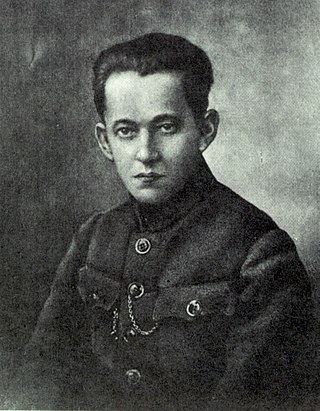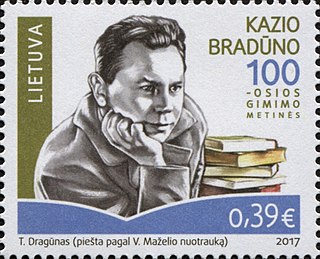Related Research Articles

Rasos Cemetery is the oldest and most famous cemetery in the city of Vilnius, Lithuania. It is named after the Rasos district where it is located. It is separated into two parts, the old and the new cemeteries, by a narrow Sukilėliai Street. The total area is 10.8 ha. Since 1990 new burials are allowed only to family graves.

Tomas Venclova is a Lithuanian poet, prose writer, scholar, philologist and translator of literature. He is one of the five founding members of the Lithuanian Helsinki Group. In 1977, following his dissident activities, he was forced to emigrate and was deprived of his Soviet citizenship. Since 1980, he has taught Russian and Polish literature at Yale University. Considered a major figure in world literature, he has received many awards, including the Prize of Two Nations, and The Person of Tolerance of the Year Award from the Sugihara Foundation, among other honors.

Lithuanian literature concerns the art of written works created by Lithuanians throughout their history.

Vincas Mickevičius, better known by his pen name Vincas Krėvė-Mickevičius, was a Lithuanian writer, poet, novelist, playwright and philologist. He is also known as Vincas Krėvė, the shortened name he used in the United States.

Kazys Bradūnas was a Lithuanian émigré poet and editor.
Vytautas Merkys was a Lithuanian historian and a professor at Vilnius University.
Ričardas Gavelis was a Lithuanian writer, playwright, journalist, and theoretical physicist. He is most known for novels such as Vilnius Poker and Memoirs of a Young Man.
Juozas Kralikauskas was a novelist and short story author.

Meilutė Julija Lukšienė née Matjošaitytė was a Lithuanian university professor, cultural historian, and activist.

Petras Cvirka was a Lithuanian writer of several novels, children's books, and short story collections. He wrote under a variety of pen names: A. Cvingelis, Cezaris Petrėnas, J. K. Pavilionis, K. Cvirka, Kanapeikus, Kazys Gerutis, Klangis, Klangis Petras, Klangių Petras, L. P. Cvirka, Laumakys, P. Cvinglis, P. Cvirka-Rymantas, P. Gelmė, P. Veliuoniškis, Petras Serapinas, and S. Laumakys. His works have been translated into Belarusian, Bulgarian, Chinese, Czech, English, Estonian, Hungarian, Latvian, Polish, Romanian, and Uzbek.

Kristina Sabaliauskaitė is an art historian, doctor honoris causa of Vilnius Academy of Arts and one of the most prominent contemporary Lithuanian writers. Born in Vilnius, she has been based in London since 2002. She worked as a foreign correspondent in London and columnist for Lithuania's biggest daily newspaper until 2010. She is best known for her opus magnum historical novel Silva Rerum and the international bestseller Peter's Empress.
Algimantas Anicetas Bučys is a poet, prose writer, translator, literary theorist, historian and critic of Lithuanian literature, doctor of Humanities.

Alfonsas Danys was a Lithuanian writer known for satire works, detective fiction and novels about a rural life, Interwar, World War II and the Soviet Lithuania.

Vytautas Alantas was a Lithuanian writer, journalist, and political ideologue. Educated in France, Alantas worked as a journalist of the Lithuanian news agency ELTA and chief editor of the official daily Lietuvos aidas. Alantas was one of the leaders of Young Tautininkai, an organization of radical young members of the Lithuanian Nationalist Union in the late 1930s – this movement is also known as Vairininkai after the political magazine Vairas. A sympathizer with national socialism, Alantas is considered to be one of the chief ideologues of totalitarian nationalism in interwar Lithuania. During the Nazi occupation of Lithuania, he participated in the Lithuanian Activist Front (LAF) and later emigrated to the United States where he dedicated his life to literary work. He was a prolific writer and published seven collections of short stories, six novels, fifteen plays, four non-fiction books, and one poetry collection. His writings primarily deal with patriotic themes and topics.
Albertas Juozėnas, mostly known by his pseudonym Juozas Baltušis was a Soviet Lithuanian writer, radio and press operative and public figure. A popular author in Lithuania, albeit with a strong Soviet identity, among his best known works are the 1947 play Gieda gaideliai, the novel Parduotos vasaros, first published in two volumes in 1957 and 1969 and Sakmė apie Juzą, a 1979 universal piece of literature which won the Lithuanian SSR State Prize and the Prix du Meilleur Livre Étranger. From 1946 to 1954 he was the secretary of the party organization of the Lithuanian Writers' Union and from 1946 to 1954 and then 1958 until 1962 he worked as the editor-in-chief of the literary magazine Pergalė (Victory). He was the deputy of the Supreme Council of the Lithuanian SSR for several decades.
Marcelijus Teodoras Martinaitis was a Lithuanian poet, essayist, translator.
Juozas Kudirka was a Lithuanian ethnologist, habilitated doctor of sciences in humanities.

Mykolas Sluckis was a Lithuanian writer.

Juozas Aputis was a Lithuanian modernist writer, translator and editor. Along with other writers such as Ričardas Gavelis, Aputis is credited for the post-war modernist novella revival in the Lithuanian SSR. He is best known for depicting village life with psychological insight and subtext. His most famous work is Anthill in Prussia, which tells the story of an ascetic man and woman who retreat into the Prussian wilderness.